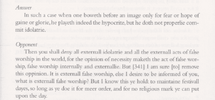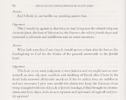I posted something similar but with more quotations than review last year and I've posted similar stuff over the years because Calvin is so misused and misquoted on this subject (e.g., here, here, here). This is a version more of a review/summary I posted to Facebook last late December. Posting here so early? Albertsons was changing out all the holiday stuff this past week so I figure if they can be so early, why can't I?
December 17, 2022. I harp on this but it bears repeating. Because of opposition to the pretended holy days such as the one coming up, you will this time of year see Calvin trotted out as either a fan or neither for nor against the observance by churches of such days. Those saying he was in favor simply don’t know or understand the corpus of what he had to say on the subject. Nor was Calvin simply neutral, neither for nor against their observance. His view was complicated since he was viewed as a leader of the Reformation in that he had personal views and then there is what he said diplomatically to keep peace amongst the churches. This was particularly true with Bern and other churches with regard to the old pretended holy days, which they chose to retain while others did not or sought to get out from under. Calvin himself knew how ‘hot’ the question could be since it was among other things the imposition which Bern placed on Geneva of following Bern’s worship practices, including five of the old holy days, which got Calvin and Farel ejected from Geneva when they took a stand against the Bern impositions in 1638. Farel had abolished all holy days except the Lord’s Day and Calvin was in agreement with this when he joined him in the ministry in 1536 after Farel practically put a curse on him if he refused. After this, Calvin would rather have died than return to Geneva, but Farel again prevailed on him and when he returned to Geneva for the 1540s forward he agreed to abide by the imposed Bern worship practices—and then immediately preceded to work at getting rid of the observance of those pretended holy days! It continued a hot dispute as he writes in his letters and by 1550 the authorities had had enough and outlawed the remaining days and moved Christmas to simply a nativity sermon on the closest Lord’s Day to December 25th. So, I think simply saying Calvin was neither for nor against does not do justice to his more full view. He was not for denigrating sister churches, but he himself opposed the old holidays and by 1557 would write, “With respect to ceremonies and above all the observance of holy days [I offer the following]: Although there are some who eagerly long to remain in conformity with such practices, I do not know how they can do so without disregard for the edification of the church, nor [do I know] how they can render an account to God for having advanced evil and impeded its solution…. Nevertheless, since we have to endure a number of imperfections when we cannot correct them, I am of the opinion that no brother ought to allow the above to be the cause of his leaving his church, unless the majority support the opposite.” Letter, December 25, 1557, in Calvin’s Ecclesiastical Advice, p. 90. In this he had been fairly consistent, though playing the diplomat with those like Bern and disclaiming a hand in Geneva’s ceasing to observe the imposed Bernese observances. He may have not had a direct hand but he had been working and teaching against such observances, which surely was a factor with the council. As one scholar writes, the council would have not made a final move against the remaining days in 1550 without knowing Calvin would not have opposed it. In fact, he does say he believed it was a good move even if he might have done it differently (to paraphrase). So I think it is simplistic to say he was neither for nor against; he most certainly was against and he advised churches that were able to get rid of the days, to never return to their observance.
So, in sum, Calvin was against criticizing the sister church down the street who did different from you. Yet, what was his advice when church leaders asked about the pretended holy days? His consistent stance from the time Farel banned them in Geneva, through their imposition by Bern and his banishment, and upon his return to the end of his ministry, was to oppose their imposition, to advise if possible to get out from under them, he himself worked to reduce the observance of them in Geneva after his return, and he was satisfied with Geneva’s ban of them in 1550, and heavily censored those as blamable late in his ministry who retained them. That sure does not sound like being neither for nor against holy days.
The above is based on all the material I could find, with some new translations never before in English, collected and presented in “In Translatiōne: John Calvin’s Letters to the Ministers of Montbéliard (1543–1544): The Genevan Reformer’s Advice and Views of the Liturgical Calendar,” The Confessional Presbyterian 13 (2017): 198-220, translations by David C. Noe and background by Chris Coldwell.


